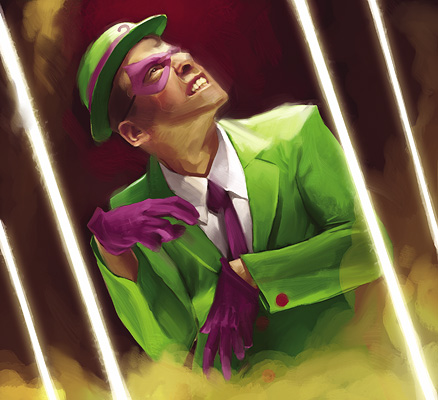Riddle Me This, by Tyler Smith
I’ve spoken quite a bit about how much I love the Riddler. I remember being a fan of the character since first watching Frank Gorshin’s manic performance in reruns of the campy Batman series of the 1960s. My fascination with the character only grew when faced with the devious, egotistical incarnation in “Batman: The Animated Series.” I was so in love with the character that even Joel Schumacher’s ridiculous Batman Forever couldn’t ruin him for me.
People have asked me exactly what I see in the character. Surely, the Joker is more intriguing, Two-Face more tragic. Indeed, there are at least four or five Batman villains that should be my favorite. But, for some reason, I keep returning to Edward Nygma.
I’ve always identified with the Riddler more than any other member of Batman’s rogue’s gallery. In a way, he was like me (if I was much smarter). His emphasis wasn’t on brawn, but brain. For the Riddler, crime was an intellectual pursuit, really no different than any other puzzle to be solved. The other villains may have had more intriguing gimmicks, but, with the exception of the Joker, few are so attached to an ideology as the Riddler.
The Riddler is, in some ways, the ultimate teacher. He challenges Batman and the police to put their brains to use in abstract ways, adapting to his puzzles as more are provided. To do so requires incentive, and the Riddler often provides it. If you solve the puzzle, you catch the criminal. If you don’t, however, someone could get hurt.
And, so, Batman would start thinking. Perhaps the answer to each riddle is the clue. Or perhaps the answers work together to provide the clue. Or perhaps the answers don’t matter; perhaps the riddles themselves are the clue. And, if one were to actually solve the larger question, one would reap the reward, often being the apprehension of the Riddler himself. In his method, the Riddler is sending a clear message about intelligence.
“Catching me will not be easy, but, if you do, you deserve to.”
The Riddler truly believes that knowledge is power, and backs that belief up to such a degree that he risks his own imprisonment. Some have said that this makes the Riddler one of the dumber villains in the DC Comics universe.
I, on the other hand, believe that this is an indicator of the Riddler’s depth as a character. While Two-Face’s story may be a sad one, the Riddler’s is actually more tragic, if one were to apply the Shakespearean definition of the word. Many of Shakespeare’s most memorable characters were great men whose downfall was not brought about by external forces, but by some internal flaw that drives them to their own defeat. As such, while some may view the Riddler’s methods as inherently foolhardy, I would call them a byproduct of his insecurity and pride.
The Riddler prizes intellect, to be sure, but his genius doesn’t exist in a vacuum. He is a brilliant criminal, and could very easily get away with his crimes. However, if he were to do so, nobody would know just how perfect said crimes were. It’s not enough for him to be a genius, or even to know he’s a genius; he needs others to know it, too.
The Riddler’s dilemma is one that should be familiar to those that consider themselves to be intellectuals. He has spent his life developing his mind, only to find that he lives in a world where few people actually value brainpower. Suddenly, he finds that he is a man without definition.
The only way to truly be appreciated is to reward intelligence and punish ignorance. Only when people struggle to figure out his ingenious puzzles will they realize how foolish they are, and, by extension, how brilliant the Riddler is. Only then will they know that it was they that wasted their lives. In the end, it is knowledge that wins, and the Riddler is the most knowledgeable of all.
“How could we be so stupid?! Why couldn’t we be more like Edward Nygma?! Then we wouldn’t be where we are now, desperately trying to stop the Riddler’s masterful crime spree!”
Surely, this is the dialogue that the Riddler plays in his head over and over as he plans his crimes. The idiots may have laughed at the nerd when he was young, but they’ll see. They’ll all see. The Riddler will have the last laugh!
The Riddler’s life is a quest for vindication; a struggle for confirmation that he has made the right decisions and followed the right path. And, in his desire for recognition and appreciation, he gives other people the weapon with which to bring him down. And they always do.
It’s sad, in a way, that the Riddler is so insecure and desires approval so deeply that he is willing to risk spending the rest of his life in prison. To him, it is worth it. It’s a gamble that he will always take, regardless of the consequences.
Perhaps this is why I appreciate the Riddler so much. For those of us that have devoted our lives to academic endeavors, acquiring very few practical skills along the way, the Riddler remains a cautionary tale. We will blog or podcast or comment; any way to get our carefully-developed opinions out to the people, all the while hoping that those people respond positively, saying how very smart and educated we are. We know that we’re making ourselves vulnerable; that, in merely putting ourselves out there for all to see, we’re giving people the key to our happiness and misery. But we do it, anyway, in spite of ourselves.
The question that we must ask ourselves, though, is, “How important is it that people love me?” Are we willing to hinge our entire identity on the ever-fickle, ever-conditional approval of others, or will we find something else to define us?
Riddle me that, Batman.
































Hi Tyler!
I really liked this blog entry. You really have an appreciation and rightly so. The riddler is an awesomely weird character. I can’t lie, Jim Carrey’s portrayal of him made me a fan. But I wonder if you’ve seen “the batman”? He’s completely redesigned to be this lethal force of both brains and a bit of brawn.
Also, I’m sure you heard the rumors that at some point he was to be the villain in “the Dark Knight rises”. While I don’t know if that hold’s true still, who would you cast?
Hey there,
Big fan of the show.
As a lifelong Batman enthusiast (at the risk of sounding self-important, I’ll go ahead and say “scholar” too), I think you hit the nail right on the head with the Riddler. He may not be the most dangerous villian, or the most sympathetic, but he does occupy an thematic space that none of the other rogue’s gallery touch on much. What makes so many of Batman’s other foes so dangerous is the fact that they lack a certain amount of vanity, whereas Edward Nigma is ruled by it. That may not always make him an effective villian. But as you pointed out, it doesn’t make him an any less interesting one.
There are too many Riddler haters in the comic book world. It’s nice to see someone stick up for him.
Someone should write a piece like this for Crazy Quilt.